 Petzlover
Petzlover Kuvasz is originated from Hungary but Lithuanian Hound is originated from Lithuania. Kuvasz may grow 15 cm / 6 inches higher than Lithuanian Hound. Kuvasz may weigh 20 kg / 45 pounds more than Lithuanian Hound. Both Kuvasz and Lithuanian Hound has almost same life span. Kuvasz may have less litter size than Lithuanian Hound. Kuvasz requires Moderate Maintenance. But Lithuanian Hound requires Low Maintenance
Kuvasz is originated from Hungary but Lithuanian Hound is originated from Lithuania. Kuvasz may grow 15 cm / 6 inches higher than Lithuanian Hound. Kuvasz may weigh 20 kg / 45 pounds more than Lithuanian Hound. Both Kuvasz and Lithuanian Hound has almost same life span. Kuvasz may have less litter size than Lithuanian Hound. Kuvasz requires Moderate Maintenance. But Lithuanian Hound requires Low Maintenance
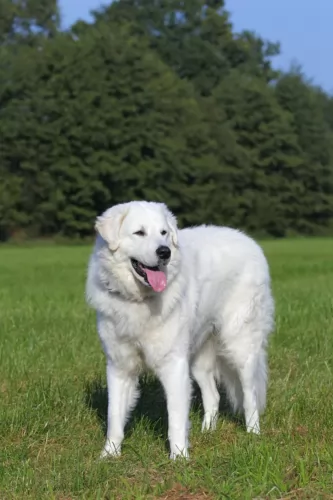 The Kuvasz is an ancient dog breed from Hungary. It is believed that the dog is the oldest of the ancient Hungarian dog breeds, and in fact a fossilized skeleton dating back to the 9th century, and almost identical to the modern Kuvasz, was found near Keszthely.
The Kuvasz is an ancient dog breed from Hungary. It is believed that the dog is the oldest of the ancient Hungarian dog breeds, and in fact a fossilized skeleton dating back to the 9th century, and almost identical to the modern Kuvasz, was found near Keszthely.
During the 15th century the Kuvasz became very sought after, being found in royal courts. Puppies were given as royal gifts. Later the popularity of the breed waned and then it was found in its traditional role of guarding livestock.
As Kuvasz numbers dwindled, breeding efforts were started but it is believed that other large dogs such as the Great Pyrenees were used with the Kuvasz to continue with the breeding programs.
In 1884, the first Hungarian standard for the breed was written. It was in 1966 that the Kuvasz Club of America was established.
 This attractive dog hails from Lithuania.This is an old dog breed that has been used as a hunting dog.
This attractive dog hails from Lithuania.This is an old dog breed that has been used as a hunting dog.
It is believed that this dog dates way back to the 16th century and that it was developed from the mixing of hound breeds – Bloodhounds, Beagles, Polish Hounds and Russian Hounds.
The numbers of the dogs decreased and in the late 1970s, the Lithuanian Cytological Council developed a kennel facility for restoring Lithuanian Hound numbers, and a standard was also written. This breed is rare and is not usually found outside the Republic of Lithuania.
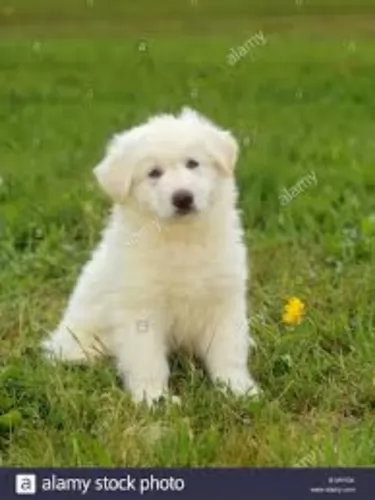 The beautiful Kuvasz is a large, muscled dog standing at 65 – 76cm in height and weighing 35 – 52kg. He has a double coat of dense white hair which can be straight or wavy.
The beautiful Kuvasz is a large, muscled dog standing at 65 – 76cm in height and weighing 35 – 52kg. He has a double coat of dense white hair which can be straight or wavy.
It is natural for the dog to lose most of the long coat during the Summer months. In other words this dog has a seasonal coat.
The nose is black, the eyes brown and alert, the ears are of medium length and floppy and the tail is carried long and low.
The Kuvasz is an intelligent dog who will benefit from training and socialization. It is always wise to have large dogs like this trained because just his size can cause problems if he isn’t obedient.
He is also described as a clownish type of dog which means he’ll entertain and amuse you. Certainly he is playful as a puppy but he calms down quite a bit as he grows into maturity. He is independent, and those who have owned such a dog report that he can be loving and loyal with his human family, wanting to guard and protect them. Others will say that he tended to be aloof, even with his human family.
Used as working dogs, the Kuvasz has learned to be independent and they will need a firm, strong owner who is also fair with them, otherwise they just do their own thing. They’re active dogs and because of their size they won’t suit city living where there is a tiny garden.
 The Lithuanian Hound is a medium-sized dog which stands at between 53 - 61 cm in height and weighs between 27 to 32kg.
The Lithuanian Hound is a medium-sized dog which stands at between 53 - 61 cm in height and weighs between 27 to 32kg.
He is a well proportioned, sturdy dog, heavily boned and muscular with straight, strong legs. The coat of the dog is short, smooth and essentially black with some tan markings. He has a large head, bright brown eyes, black nose, deep, broad chest and long, floppy ears with rounded tips. The tail of the dog is long and held low.
The attractive Lithuanian Hound is a sighthound known for his hunting skills which he does with great determination and stamina.
He loves going on the hunt and forms a strong bond with his hunting handler, being reserved with people he doesn’t know. Lithuanian Hounds are generally easy to train and are eager to please. Training and socialization will be easy with a dog like this as he is intelligent and keen to please.They respond well to an owner who is confident, fair, patient and consistent.
His attachment to the family makes him a good watchdog too. After the hunt, he becomes an amicable, friendly, loving dog, loving to spend a quiet evening with his human family. He is energetic and doesn’t take too kindly to sitting around for long periods. He loves to be on the go and will require a good deal of vigorous exercise.
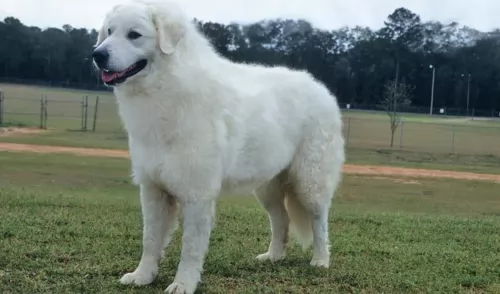 Kuvasz are guarding dogs, they’re intelligent and loyal, making them excellent family dogs with the right training and socialization.
Kuvasz are guarding dogs, they’re intelligent and loyal, making them excellent family dogs with the right training and socialization.
They’re able to get on well with other pets in the home as well as children. He is a beautiful dog and another bonus is that he isn’t particularly high maintenance.
As is common with many other large-breed dogs, he will have a shorter lifespan than what you’d get with a smaller dog breed, but if you feed him high quality food, exercise him and involve him in your activities, this large dog can become a wonderful friend and protector for you.
 The Lithuanian Hound has always been a dog used for hunting, so he wants to belong to a family where hunting is still practiced or where there is a large garden.
The Lithuanian Hound has always been a dog used for hunting, so he wants to belong to a family where hunting is still practiced or where there is a large garden.
He is smart and easy to train, and what’s more he’s a healthy, robust, low maintenance dog. He’s an amicable dog too, calm, independent and confident, and will make a splendid companion to his human family. He gets on well with children and is willing to share his space with other dogs too.
By choosing the Lithuanian Hound, you’re allowing a wonderful canine friend into your home and heart.
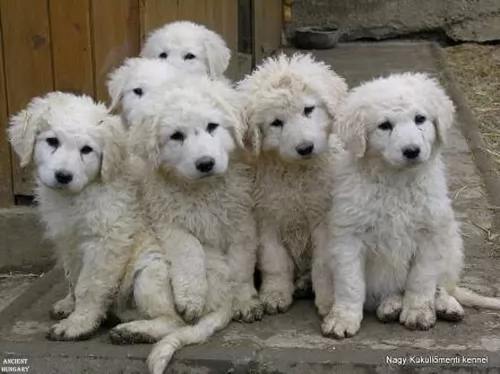 The large Kuvasz is a healthy dog breed that with good care can reach 12–14 years of age. Being the large dog that he is, he may well be prone to bone and joint problems. It is why good nutrition is so important for this dog - feeding him the best food with vitamins and minerals.
The large Kuvasz is a healthy dog breed that with good care can reach 12–14 years of age. Being the large dog that he is, he may well be prone to bone and joint problems. It is why good nutrition is so important for this dog - feeding him the best food with vitamins and minerals.
You know the saying ...you are what you eat... and this applies to dogs too. Good food can help to ward off serious illnesses. Big dogs like this often have to contend with hip dysplasia which can be both painful and debilitating as well as eye diseases.
This is where the eyelid of the dog rolls inwards, causing irritation and pain for the dog. There is also Ectropion, where the eyelid rolls outwards.If you see your pet has a red eye which is watery and which has pus, visit your vet. Entropion surgery will correct and repair and condition.
 Lithuanian Hounds can reach 12 – 14 years of age when they’re loved and well cared for. You won’t find many medical problems with this robust dog breed, but it pays to know some of the more common dog illnesses.
Lithuanian Hounds can reach 12 – 14 years of age when they’re loved and well cared for. You won’t find many medical problems with this robust dog breed, but it pays to know some of the more common dog illnesses.
This is a genetic condition that affects the hips and which can lead to painful arthritis. Dogs prone to hip and elbow dysplasia always benefit by avoiding obesity.
Deep chested dogs are more prone to Bloat, occurring when gas builds up in the stomach and can’t escape. This is a life threatening illness and immediate medical attention will be required.
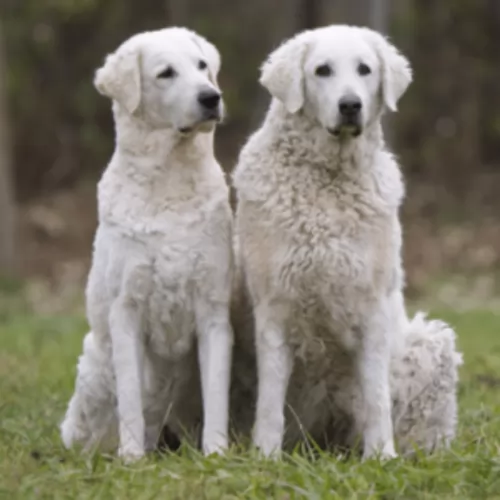 The coat may be fairly long and thick but it doesn’t require any special kind of grooming. A good brush twice a week will be adequate and will help with getting rid of stubborn knots and matting.
The coat may be fairly long and thick but it doesn’t require any special kind of grooming. A good brush twice a week will be adequate and will help with getting rid of stubborn knots and matting.
He is a seasonal shedder and this frequent brushing will make sure the coat remains groomed and shiny.
The Kuvasz is a hardy breed who just loves the outdoors. He is a dog that doesn’t do well in the heat. Make absolutely sure that he has a cool, sheltered spot where he can lie down. Ensure that there is always a bowl of fresh, cool water available to him.
There is quite a bit of conflict and controversy regarding nutrition in dogs. The idea is to keep it simple. If you buy a commercially manufactured dog food, check the ingredients on the packaging.
You want to be sure your pet is getting vitamins and minerals in instead of preservatives, fillers and colorants. Try and give him some home made food too such as some chicken, brown rice or pasta and some vegetables. You can mix this into his dry kibble occasionally with a little bit of raw meat too when you have.
Avoid feeding your dog things such as chocolates, nuts, onions, sweets and chips.
 This energetic dog is going to want a lot of exercise as he has always been a hunting dog. While a long, brisk walk will be excellent for him, he will want more activity than that. He’ll want to be included in all your activities – walks, hikes, camping trips and swimming.
This energetic dog is going to want a lot of exercise as he has always been a hunting dog. While a long, brisk walk will be excellent for him, he will want more activity than that. He’ll want to be included in all your activities – walks, hikes, camping trips and swimming.
A big positive with the beautiful, sleek Lithuanian Hound is that he is looked upon as a low maintenance dog. The short coat will require a good brush down twice a week.
He sheds a couple of times during the year. He’s the kind of dog who thrives on these grooming sessions and it’s a time to check him over for ticks and fleas as well as for odd lumps.
Look inside his ears too, particularly since he is a floppy eared dog. Open his mouth too and keep his teeth brushed and clean. There is special canine toothpaste and toothbrush for this purpose. Never try to use human toothpaste as it can be toxic for your dog.
There are a number of things to consider when it comes to feeding your dog, but it goes without saying that the best, most nutritious food will ensure health and longevity.
If you feed your pet commercially manufactured pet food, use the feeding guidelines found on the packaging labelling. With any new food types you give your dog, keep an eye on him for reactions.
Your dog’s metabolism and energy levels as well as his age will determine how much to feed him.
There are many excellent dog foods available – choose an excellent one and make sure to feed your dog some tasty, nutritious home-made food too.
You can’t go wrong with some cooked chicken, brown rice or pasta and some raw and cooked vegetables. Chop up and add to his dry kibble from time to time and he’ll be happy and healthy. Raw meat is expensive but try and include some every now and then as it contributes to allergy-free skins, bright eyes, shiny coats, wet noses and wagging tails.